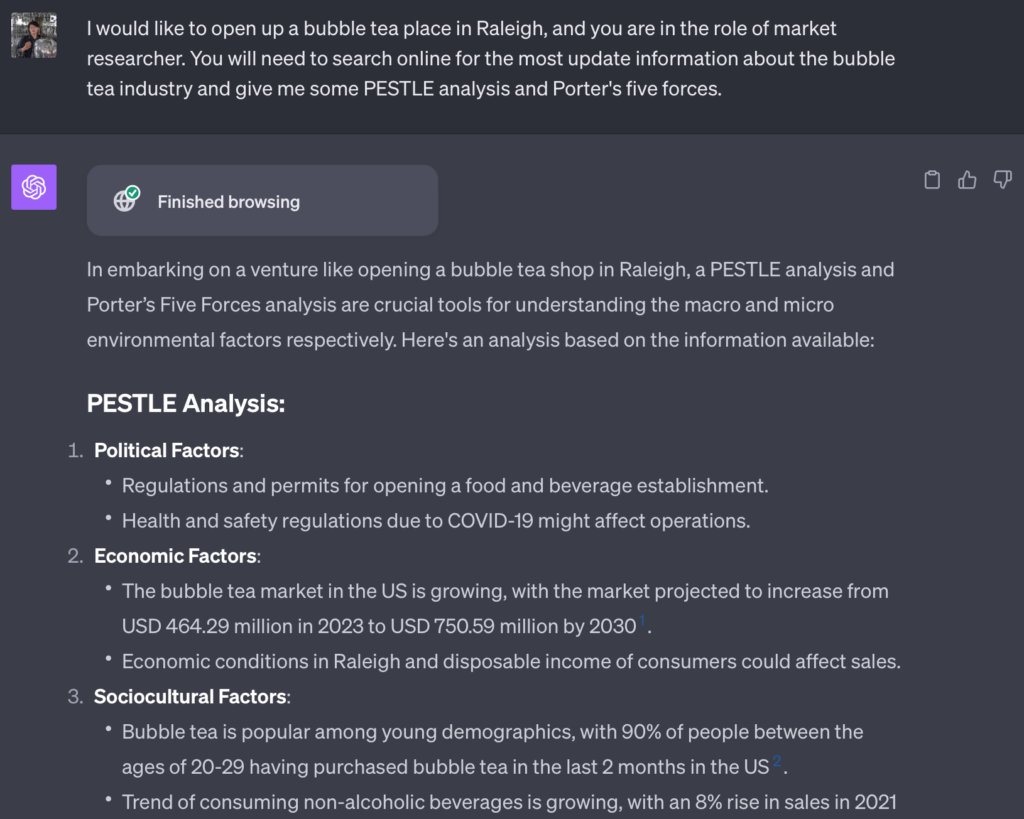Artificial Intelligence (AI) has been a topic of interest since my childhood. While my impression of it remained confined to fiction and movies, it had already begun to impact our lives in ways we hardly noticed. In the marketing world, [1]Google has been utilizing its AI systems, such as RankBrain and Bert, to better understand context for improved search results. [2]Sprinklr, a platform widely used for social listening, has integrated their Sprinklr Intuition™ AI to manage engagement on social platforms about products and services, thereby maintaining brand reputation. However, these advancements remained largely unnoticed until the launch of ChatGPT last year. I believe this has changed the landscape of marketing. Rather than being replaced by AI, we should proactively master these tools to maintain control.
Areas Where We Can Utilize ChatGPT and Other AI Tools:
Market research (Market size, competitors) SWOT & PESTLE:
 Years ago, during my first marketing internship and academic projects, we manually conducted PESTLE, SWOT, and Porter’s Five Forces analyses for specific companies. Now, GPT-4 can perform these tasks for you. By using the GPT-4 browsing feature with Bing or a plugin called WebPilot, this AI can break through its limitations and provide real-time information about almost anything you wish to know in the industry.
Years ago, during my first marketing internship and academic projects, we manually conducted PESTLE, SWOT, and Porter’s Five Forces analyses for specific companies. Now, GPT-4 can perform these tasks for you. By using the GPT-4 browsing feature with Bing or a plugin called WebPilot, this AI can break through its limitations and provide real-time information about almost anything you wish to know in the industry.
If you want to gather industry information, you can simply instruct your AI, like GPT-4, to act as a Market Researcher. You should provide your business information, the location and scope of your business, your budget, and more. The AI will then give you an overview of these analyses. You can also dig deeper into any information or aspect it presents to you to find your niche or unique advantage in the market.
STP (Segmentation, Targeting, Positioning):
Based on the industrial and environmental information received from AI research, you can identify market segments and current customer personas. Therefore, you can propose several ideas for your own targeting and positioning strategies with unique propositions. AI can further assess the feasibility and likelihood of success for each strategy.
Customer Journey Design:
With GPT-4, you can likely abandon your paper and pen to create your desired customer journey. However, you still need to understand the overall framework, from Awareness to Advocacy. You will need to provide the background information you have gathered, such as industrial data, your own business canvas, your desired positioning, and targeted personas to your AI tool. For each step of the journey, you will need to specify how your product or service addresses your target customers’ pain points with unique and distinguishing features.
Marketing Promotion (Specifically in Digital Marketing):
Content Creation: By utilizing DALL·E 3 and plugins like Canva and CapCut, you can generate nearly complete drafts of images and videos for your marketing campaigns. However, these drafts will still require your fine-tuning.
Copywriting: Most of us experience creative blocks at times, periods when we cannot produce anything interesting. AI can now assist with this. You can either draw inspiration from AI-generated ideas or have it create content for you. For in-house marketing, you can feed your AI tool, like GPT-4, with previously successful ad copies and instruct it to generate new ones for new products or services. By doing so, the AI will understand the tone and language your company uses, aligning the generated copies with your branding.
SEM (Search Engine Marketing): Keywords are crucial for both paid and organic search. Before writing an affiliated blog or listing a product or service online, we usually search for high-traffic or high-potential keywords to include in the title and content. AI can generate titles and texts with various keyword combinations to make them SEM-friendly. However, it should be used as a supplement to mainstream SEM tools.
Data Analysis and Visualization: In marketing, data is crucial for improving our campaigns. Raw data needs to be translated into actionable insights and shared with stakeholders. AI tools like GPT-4 can quickly process and interpret this data, providing valuable suggestions. [3]Tableau has announced its AI tool, Tableau Pulse, which will be available in 2024. It will not only automate data visualization but also understand context and predict trends, enabling marketers to make quicker and more accurate decisions.
In conclusion, while AI tools like GPT-4 offer powerful capabilities for improving marketing campaigns and strategies, it is crucial not to become overly reliant on them. There are still no clear data privacy regulations in the AI sector, and it is essential for marketers to exercise caution and maintain their own opinions. After all, we are the ones using the tools, not the other way around.
References:
[1] https://blog.google/products/search/how-ai-powers-great-search-results/
 Do you find this article helpful or wish to discuss it further? Contact me at [email protected] or read more about me.
Do you find this article helpful or wish to discuss it further? Contact me at [email protected] or read more about me.
AI’s Role in Modern Marketing
Artificial Intelligence (AI) has been a topic of interest since my childhood. While my impression of it remained confined to fiction and movies, it had already begun to impact our lives in ways we hardly noticed. In the marketing world, [1]Google has been utilizing its AI systems, such as RankBrain and Bert, to better understand context for improved search results. [2]Sprinklr, a platform widely used for social listening, has integrated their Sprinklr Intuition™ AI to manage engagement on social platforms about products and services, thereby maintaining brand reputation. However, these advancements remained largely unnoticed until the launch of ChatGPT last year. I believe this has changed the landscape of marketing. Rather than being replaced by AI, we should proactively master these tools to maintain control.
Areas Where We Can Utilize ChatGPT and Other AI Tools:
Market research (Market size, competitors) SWOT & PESTLE:
Years ago, during my first marketing internship and academic projects, we manually conducted PESTLE, SWOT, and Porter’s Five Forces analyses for specific companies. Now, GPT-4 can perform these tasks for you. By using the GPT-4 browsing feature with Bing or a plugin called WebPilot, this AI can break through its limitations and provide real-time information about almost anything you wish to know in the industry.
If you want to gather industry information, you can simply instruct your AI, like GPT-4, to act as a Market Researcher. You should provide your business information, the location and scope of your business, your budget, and more. The AI will then give you an overview of these analyses. You can also dig deeper into any information or aspect it presents to you to find your niche or unique advantage in the market.

STP (Segmentation, Targeting, Positioning):
Based on the industrial and environmental information received from AI research, you can identify market segments and current customer personas. Therefore, you can propose several ideas for your own targeting and positioning strategies with unique propositions. AI can further assess the feasibility and likelihood of success for each strategy.
Customer Journey Design:
With GPT-4, you can likely abandon your paper and pen to create your desired customer journey. However, you still need to understand the overall framework, from Awareness to Advocacy. You will need to provide the background information you have gathered, such as industrial data, your own business canvas, your desired positioning, and targeted personas to your AI tool. For each step of the journey, you will need to specify how your product or service addresses your target customers’ pain points with unique and distinguishing features.
Marketing Promotion (Specifically in Digital Marketing):
Content Creation: By utilizing DALL·E 3 and plugins like Canva and CapCut, you can generate nearly complete drafts of images and videos for your marketing campaigns. However, these drafts will still require your fine-tuning.
Copywriting: Most of us experience creative blocks at times, periods when we cannot produce anything interesting. AI can now assist with this. You can either draw inspiration from AI-generated ideas or have it create content for you. For in-house marketing, you can feed your AI tool, like GPT-4, with previously successful ad copies and instruct it to generate new ones for new products or services. By doing so, the AI will understand the tone and language your company uses, aligning the generated copies with your branding.
SEM (Search Engine Marketing): Keywords are crucial for both paid and organic search. Before writing an affiliated blog or listing a product or service online, we usually search for high-traffic or high-potential keywords to include in the title and content. AI can generate titles and texts with various keyword combinations to make them SEM-friendly. However, it should be used as a supplement to mainstream SEM tools.
Data Analysis and Visualization: In marketing, data is crucial for improving our campaigns. Raw data needs to be translated into actionable insights and shared with stakeholders. AI tools like GPT-4 can quickly process and interpret this data, providing valuable suggestions. [3]Tableau has announced its AI tool, Tableau Pulse, which will be available in 2024. It will not only automate data visualization but also understand context and predict trends, enabling marketers to make quicker and more accurate decisions.
In conclusion, while AI tools like GPT-4 offer powerful capabilities for improving marketing campaigns and strategies, it is crucial not to become overly reliant on them. There are still no clear data privacy regulations in the AI sector, and it is essential for marketers to exercise caution and maintain their own opinions. After all, we are the ones using the tools, not the other way around.
References:
[1] https://blog.google/products/search/how-ai-powers-great-search-results/
![]() Do you find this article helpful or wish to discuss it further? Contact me at [email protected] or read more about me.
Do you find this article helpful or wish to discuss it further? Contact me at [email protected] or read more about me.